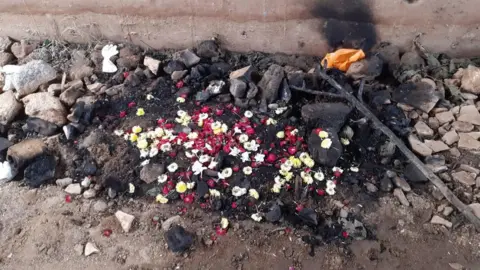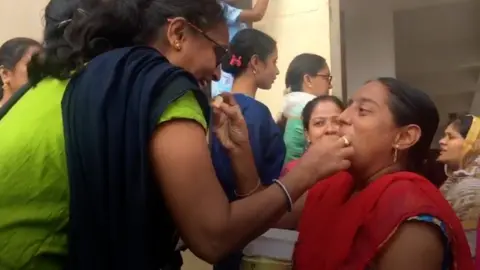Hyderabad case: Why Indians are celebrating the killings
The killings of four men accused of gang-raping and murdering a young woman last week in Hyderabad have been largely greeted with joy in India.
Just hours after the shootings, about 2,000 people gathered at the site to celebrate the police action.
They chanted "police zindabad" ("hail the police"), distributed sweets and showered flowers on the spot where the 27-year-old vet's charred body was found last week and where the shooting took place on Friday morning.
In her neighbourhood too, a large number of people gathered, setting off celebratory firecrackers and distributing sweets.
The celebrations and support for the police are continuing online too.
On Twitter, there are more than 300,000 tweets with various hashtags about the shooting and the crime, with most of the voices supportive of the police action.
And there is a reason for that: the meandering pace of the Indian judicial system means it often takes years, even decades, to deliver justice.

There are tens of millions of pending cases in courts, including nearly 150,000 cases of rape, and this has eroded the public faith in the criminal justice system.
The biggest example of this in recent years is the December 2012 torture, gang-rape and murder of a 23-year-old woman on a bus in Delhi.

Allow X content?

The brutal crime made global headlines, saw days of protests in Delhi and other parts of India and forced the government to enact tougher new laws, including introduction of the death penalty in rare cases.
But despite all that attention, the wheels of justice have turned slowly for the 23-year-old victim's family.
Seven years later, her mother Asha Devi has alleged that the men, who are on death row, have used every loophole in law to delay their execution.
No surprises then that she was among the first people on Friday to hail the Cyberabad police:

Allow X content?

In the past few years, Asha Devi has become the face of the frustration many Indians say they feel at how the system fails victims of some of the worst crimes.
After last week's reports on the Hyderabad rape, many were articulating that same frustration again, raising concern that the rapists would "continue to feast on our taxes" for years while the victim's parents would also run from "pillar to post" for justice.
It's this declining faith in the system that has led many in India to demand and support instant justice.
It has also fuelled a craze in recent years for popular movies that show "trigger-happy, vigilante cops" brazenly carrying out extrajudicial executions.
So it was not surprising that on Friday morning, hours after the news of the shooting, one of the top Twitter trends in India was #Singham, comparing the Cyberabad policemen to the revenge-seeking police officer-hero of the 2010 Tamil film Singam, made a year later as Singham by Bollywood.
However, some people have questioned Friday's shooting, describing it as an execution of suspects without a trial.

"Trigger-happy policemen with an utter disregard for the law are not the answer we seek," Prof Kalpana Kannabiran, from the Council for Social Development in Hyderabad, told BBC Telugu.
"The ends of justice are not served by wanton killing and retributive bloodlust. The course of justice is not determined by the grief and grieving of victims' families.
"Justice lies in supporting them in their moment of grief and pain and insisting on due process that brings suspects and accused to trial through a robust, stringent and competent criminal investigation."
Prakash Singh, a former police officer, told the BBC that the killings were "entirely avoidable" and some legal experts described them as "unconstitutional" and asked whether justice really had been done.
Some wondered whether the police had arrested the right men and whether they had not just picked up some poor truckers to pacify public anger.
One man on local TV said he found it unbelievable that all four men had had to be shot dead because they were trying to snatch the weapons of the police. "All four?" he kept asking.
But on Friday, such voices are in a minority.
